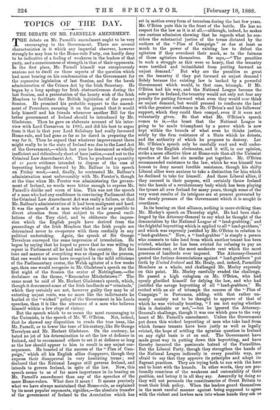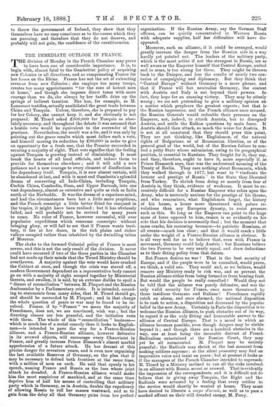TOPICS OF THE DAY.
THE DEBATE ON MR. PARNELL'S AMENDMENT. THE debate on Mr. Parnell's amendment ought to be very encouraging to the Government. There are several characteristics in it which any impartial observer, however strongly he may lean to the Home-rule Party, can hardly deny to be indicative of a feeling of weakness in the leaders of that party, and a consciousness of strength in that of their opponents. In the first place, Mr. Parnell himself was conspicuously anxious not to dwell on those aspects of the question which had most bearing on his condemnation of the Government for the repressive legislation of last Session, and for the harsh administration of the Crimes Act by the Irish Secretary. He began by a long apology for Irish obstructiveness during the last Session, and a protestation of the hearty wish of the Irish Members to facilitate the British legislation of the present Session. He promised his probable support to the amend- ment of Procedure, excusing it on the ground that it would help himself and his friends whenever another Bill for the better government of Ireland should be introduced by Mr. Gladstone. Then he gave an elaborate account of his inter- view with Lord Carnarvon in 1885, and did his best to argue from it that in that year Lord Salisbury had really favoured Home-rule, and had gone as far as he dared in preparing the way for it. Then he argued that whatever improvement there might really be in the state of Ireland was due to the Land Act of the Govemment,—which last year he denounced as wholly inefficient and ridiculously short of bare justice,—and not to the Criminal Law Amendment Act. Then he produced a quantity of en parte evidence intended to dispose of the case of boycotting brought forward by Mr. Balfour in his speech on Friday week,—and, finally, he contrasted Mr. Balfour's administration most unfavourably with Mr. Forster's, though at the time when Mr. Forster was administering the govern- ment of Ireland, no words were bitter enough to express Mr. Parnell's dislike and scorn of him. This was not the speech of a man who had any confidence in convincing Parliament that the Criminal Law Amendment Act was really a failure, or that Mr. Balfour's administration of it had been malignant and hard. It was the speech of a man who wished as far as possible to divert attention from that subject to the general vacil- lations of the Tory chief, and to obliterate the impres- sion which the English people have derived from the proceedings of the Irish Members that the Irish people are determined never to co-operate with them cordially in any political undertaking. Again, the speech of Sir George Trevelyan conveyed the same impression of irresolution. He began by saying that he hoped to prove that he was willing to repeat in Parliament all he had said in the country. But the tone and manner of everything was so changed in the process, that one would no more have recognised in the mild criticisms of the Parliamentary orator, the Welsh agitator of a few weeks ago, than one would recognise in Mr. Gladstone's speech on the first night of the Session the orator of Nottingham,—the declaimer on the theme, " Remember Mitchelatown !" The same must be said of Mr. Herbert Gladstone's speech, which, though it denounced some of the Irish landlords as " criminals," which they certainly are not, however guilty they may be of extorting unjust rents, was no more like the indictments he hurled at the "wicked" policy of the Government in his Leeds speeches, than it is like the utterance of a man who believes himself within a few steps of victory.
But the speech which to us seems the most encouraging to the Unionists, is the speech of Mr. W. O'Brien. Not, indeed, that he showed any disposition to evade the true issue, like Mr. Parnell, or to lower the tone of his oratory, like Sir George Trevelyan and Mr. Herbert Gladstone. On the contrary, he bated no jot of his determination to set the law at defiance in Ireland, and to recommend others to set it at defiance so long as the law should appear to him to result in any unjust con- sequences. He boasted of the success of the " Plan of Cam- paign," which all his English allies disapprove, though they express their disapproval in very hesitating terms ; and declared that the National League still governs Ireland, and intends to govern Ireland, in spite of the law. Now, this speech seems to us of far more importance in its bearing on Mr. Parnell's amendment than any of the speeches of the mere Home-rulers. What does it mean ? It means precisely what we have always maintained that Home-rule, as explained by its most popular exponents, signifies,—the absolute transfer of the government of Ireland to the Association which has set in motion every form of terrorism during the last few years. Mr. O'Brien puts this in the front of the battle. He has no respect for the law as it is at all,—although, indeed, he makes one curious admission showing that he regards what he con- siders the substantial justice of the terms dictated by the authors of the " Plan of Campaign " as due at least as much to the power of the existing law to defeat the agitators if they overshoot their mark, as to the fairness of those agitators themselves. He says,—" The penalties in such a struggle as this were so heavy, that the tenantry were terrified and intimidated from putting forward an unjust demand." But why are the penalties so great on the tenantry if they put forward an unjust demand ? Solely because the existing law is backed by a powerful Government which would, in that case, triumph. If Mr. O'Brien had his way, and the National League became the sole power in Ireland, the tenantry would not only not fear any penalty for putting forward what even they would now think an unjust demand, but would proceed to confiscate the land with the greatest confidence in Mr. O'Brien's and his followers' support, which they could then compel, even if it were not voluntarily given. So that what Mr. O'Brien's speech comes to is,—the boast that the National League is going to be made triumphant by a power which is now kept within the bounds of what even he thinks justice, solely by the firm resistance of a State which he detests, and the authority of which he proposes to destroy. Let Mr. O'Brien's speech only be carefully read and well under- stood by the English electorates, and it will, in our opinion, strike a more effective blow at Home-rule than all the Unionist speeches of the last six months put together. Mr. O'Brien recommended resistance to the law, which he was himself too honest to deny meant forcible resistance, though his shifty Liberal allies were anxious to take a distinction for him which he declined to take for himself. And those Liberal allies, if they succeed in their purpose, will certainly throw Ireland into the hands of a revolutionary body which has been playing the tyrant all over Ireland for many years, though some of the very worst results of its intrigues are at present prevented by the steady pressure of the Government which it is sought to overthrow.
In its bearing on that alliance, nothing is more striking than Mr. Morley's speech on Thursday night. He had been chal- lenged by the Attorney-General to say what he thought of the denunciation by the National League of "land-grabbing," and the frightful boycotting which is applied to all " land-grabbers,' and which was expressly justified by Mr. O'Brien in relation to " land-grabbers." Now, a " land-grabber " is simply a person who consents to take land from which another tenant has been evicted, whether he has been evicted for refusing to pay an immoderate rent, or the most moderate rent which the most generous of landlords ever imposed. The Attorney-General gilded the furious denunciations against " land-grabbers " put forth by United Ireland and Mr. Healy, and, indeed, Parnellite Members as a whole, and challenged Mr. Morley expressly on this point. Mr. Morley carefully evaded the challenge. He passed a high eulogium on Mr. O'Brien, who had openly glorified himself for defying the law, and who had justified the savage boycotting of all " land-grabbers." He recited with an air of triumph the success of the " Plan of Campaign " in Portumna, adding, with that rather un- manly anxiety not to be thought to approve of that of which he was virtually boasting, " I am not saying whether this is desirable or not,"—but he ignored the Attorney- General's challenge, though it was one which goes to the very heart of Mr. Parnell's amendment. Unless the Government put down this wicked boycotting of men who take land from which former tenants have been justly as well as legally evicted, the hope of settling the agrarian question in Ireland on any right basis is at an end. The Government have made great way in putting down this boycotting, and have thereby incurred the passionate hatred of the Parnellites. But the Liberal Party, though they strengthen the hands of the National League indirectly in every possible way, are afraid to say that they approve its principles and adopt its flagrant practices. They are trying both to run with the hare and to hunt with the hounds. In other words, they are pro- foundly conscious of the weakness and untenability of their position, and betray it in all they say. Assuredly by doing so they will not persuade the constituencies of Great Britain to trust their Irish policy. When the leaders guard themselves in the most careful manner against being supposed to agree with the violent and lawless men into whose hands they ask us
to throw the government of Ireland, they show that they themselves have no easy conscience as to the course which they are pursuing, and therefore that they do not deserve, and probably will not gain, the confidence of the constituencies.



































 Previous page
Previous page